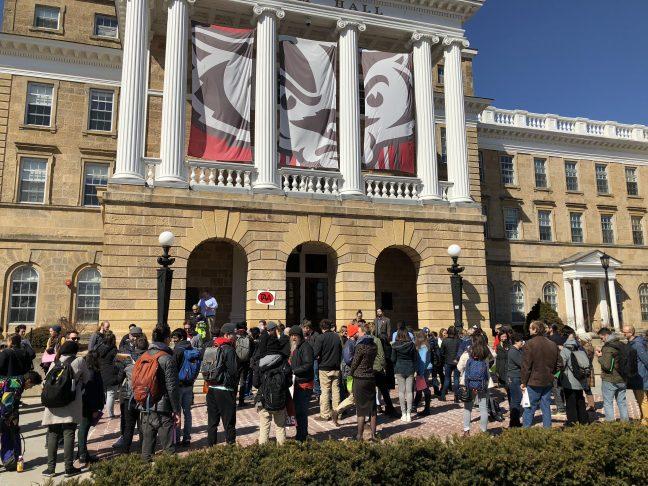Members of the Teacher’s Assistants’ Association gathered at Bascom Hall Thursday to protest the new University of Wisconsin Bursar’s Office policy regarding how graduate assistants pay their segregated fees.
The plan, which the university announced earlier this week, changes the payment plan for graduate assistants. The old plan allowed for graduate assistants to wait until their third paycheck of the semester to complete their payments. The new policy, however, would make them pay before their first paycheck.
The protesters met Thursday to protest the new plan. UW Nelson Institute for Environmental Studies Ph.D. student Francisco Santiago-Avila said the current plan is already hard enough on graduate students at the university.
“We’re protesting recent unilateral changes in our segregated fee payment policy that the Bursar had proposed a few months ago,” Santiago-Ávila said. “[The TAA] was never consulted or asked for input on the proposal, despite it impacting our livelihoods substantially, economically and emotionally due to the financial burden it places on us.”
In a statement sent out by the TAA, the group claims this policy puts fees first and graduate assistants second. The statement also said the new policy would “financially stress” graduate assistants, as nearly ten percent of their salary goes to university fees.
In response to the protest, UW spokesperson Meredith McGlone said the new plan will give a 13.3 percent pay increase for teaching and project assistants in addition to the increase in segregated fees.
The university’s response acknowledged the burdens of the segregated fees, and said graduate students will be consulted as the details of the plan are finalized.
“UW-Madison is seeking to develop flexible and reasonable segregated fee payment options that will not place additional financial stress on graduate students,” McGlone said. “Segregated fees are assessed to students to support services, activities, programs and facilities that support the university’s mission and provide direct benefit to students, like campus health services and child care assistance.”
The protest began with graduate workers gathering at the top of Bascom Hill. The protesters chanted, “Hey Bursar, what do you say? How many fees will you make us pay,” and “No cuts, no fees, education should be free.”
The group then entered Bascom Hall in silent protest, where they hung up fliers with personal stories on them.
The group then walked through Bascom and delivered petitions to administration in the Graduate Office. These petitions demanded no fee payments be required before the first paycheck. Additionally, the protesters demanded the University lessen the financial hardship their employees face by remitting segregated fees.
The protesters also want administrators to consult with graduate workers before making drastic policy changes going forward.
The group then marched down Bascom Hill, through Library Mall to East Campus Mall, ending at the Bursar’s Office, where the final decision will be made.
“Graduate workers must be consulted before making sweeping changes to graduate student payment policy — it’s the only way to ensure the implementation of sustainable policies. The university works because we do,” the TAA statement said.
UW to cover tuition, segregated fees for middle, low-income students
The group hopes after this protest, the Bursar’s Office will follow their demands and change their policy.
Tina Treviño-Murphy, TAA treasurer, believes putting graduate workers in a difficult financial position affects the entire university.
“The university works because we do. Our working conditions are our students learning conditions, they are the conditions of the research this University produces, and are a significant factor in shaping the standing of the university,” Treviño-Murphy said. “When you lift up graduate workers, the whole university is better off.”












